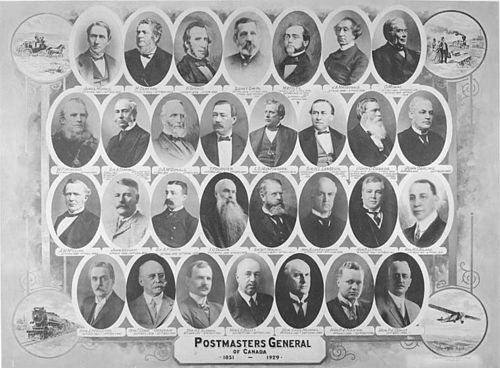
Credit: Agnes Macdonald, Baroness Macdonald of Earnscliffe Collection. / Library and Archives Canada / PA-066694
The Postmaster General of Canada was the Canadian cabinet minister responsible for the Post Office Department (Canada Post). In 1851, management of the post office was transferred from Britain (Royal Mail) to the provincial governments of the Province of Canada, New Brunswick, Newfoundland, Nova Scotia and Prince Edward Island. The position of Postmaster General was established in each province. With Canadian Confederation in 1867, a single position was created replacing this post in all of the above provinces except Newfoundland. this position was abolished in 1981 when the post office was transformed from a government department into a crown corporation. Since 1981 Canada Post has been led by a President and CEO. From 1900 until 1909 the Postmaster General was also responsible for the Department of Labour. [1] It now reports to the Minister of Public Services and Procurement.
Contents
Canada Post Corporation has had its own CEO and President since 1981, who has most of the administrative responsibilities previously exercised by the Postmaster General. With the abolition of the position of Postmaster General the legislative and certain other duties previously exercised by the Postmaster General were transferred to the new position of Minister responsible for Canada Post Corporation.
































